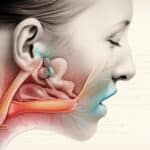MSG: The Silent Aggravator of Tinnitus You Didn’t Know About
- Get link
- X
- Other Apps
Introduction
Have you ever experienced a ringing sensation in your ears even when there’s no external sound? If the answer is yes, then you’re familiar with tinnitus. Now, you might be thinking, “Can my dietary habits, including the consumption of MSG, influence tinnitus?” Well, you’re not alone! Let’s delve deeper into these intriguing questions.
What is Tinnitus?
Tinnitus is commonly described as ear ringing. However, it’s much more than that! It’s a perceived sensation of sound where there is none. So, while some people experience it as a ringing, for others, it may manifest as a hissing, humming, clicking, or even a roaring sound. Sometimes it follows the rhythm of the heartbeat, referred to as pulsatile tinnitus. It’s not a disease in itself, but usually a symptom of underlying conditions like hearing loss, ear injury, or a circulatory system disorder.
So, what causes it? A variety of factors, from age-related hearing loss, exposure to loud noise, and earwax blockage, to certain medical conditions, including blood pressure anomalies and diabetes, can bring on tinnitus. However, have you ever considered that dietary habits, including the consumption of MSG, might play a role? Let’s dig in.
How do dietary habits affect tinnitus?
Your cheesy pizza or your favorite Chinese takeout might taste divine because of an ingredient called MSG. But this flavor enhancer might be a silent perpetrator worsening your tinnitus!
Some substances we ingest can cause a temporary spike in tinnitus. These are typically known as “tinnitus triggers” and include caffeine, alcohol, sodium, artificial sweeteners, and yes, the sneaky MSG! Now, how does this happen, and why? How does what we eat or drink affect the noises in our ears? Research has shown that these substances can cause or increase tinnitus symptoms by altering your blood flow.
MSG, short for Monosodium Glutamate, enhances flavors but may have less palatable effects on your health. Not everyone will react to MSG the same way, but for those sensitive to it, the impact could be pronounced, exacerbating conditions like tinnitus. So, while a poke bowl might light up your taste buds, it could also light up tinnitus!
While there’s still more to explore about the diet-tinnitus relationship, evidence suggests a notable connection. Modifying our dietary habits could be a vital key to managing these buzzing, ringing invaders in our ears. Are you ready to unlock the door to a resounding silence?
What is MSG and its linkage to Tinnitus?
Monosodium glutamate, popularly known as MSG, is a flavor enhancer commonly used in canned vegetables, soups, processed meats, and more. It’s like the secret ingredient we never knew about! But how does this seemingly harmless ingredient link to the ear-buzzing annoyance that is tinnitus?
MSG has the potential to cause tinnitus due to its role in vasodilation – the widening of blood vessels. This effect can trigger a form of tinnitus known as somatic tinnitus, where the annoying ringing is connected to the body’s physical movements and functions. Simply put, consuming foods spiked with MSG might not just result in a flavor burst, but an unexpected ear-ringing episode as well.
But MSG isn’t the only culprit lurking in our meals. Let’s address the party players – caffeine and alcohol, too, shall we?
Caffeine, Alcohol, and Other Triggers
You might enjoy a fresh, hot cup of coffee or a cold beer after a long day, but the joy could be short-lived if you are battling tinnitus. Certain substances, like caffeine and alcohol, have been closely linked to tinnitus flares.
Research suggests that caffeine seems to have a dual role in tinnitus. The attack of the ear buzz seems to be a hit or miss with your morning cup of joe. While some studies find that caffeine could worsen tinnitus, others provide a counter-argument that abstaining from it could actually enhance the symptoms. In other words, it’s a cliffhanger! To drink or not to drink? The answer depends on your body’s response to caffeine. To investigate, check out this comprehensive page on the connection.
As for its polar opposite – alcohol – researchers have found it to be a more consistent instigator. The relaxation that alcohol offers notoriously comes with increased blood flow – an infamous trigger for tinnitus. Understand how alcohol could play a part in your tinnitus here.
Understanding the role of these substances in your diet can be a game-changer in managing the silent symphony of tinnitus. Beware, though, the list of potential triggers doesn’t end here! Keep exploring to minimize tinnitus interference in your peaceful day-to-day life.
Now, with all these facts at our disposal, how can we cope with these invisible perpetrators? Is there a way to enjoy our favorite foods without the fear of tinnitus? Let’s find out!
Coping with MSG-related Tinnitus
So, you’ve discovered your tinnitus triggers, and MSG has its fingerprint all over it. What’s next? Arm yourself with strategies to cope with the flare-ups. One way to manage MSG-induced tinnitus is by making alterations in your diet.
Remember, it’s not just about eliminating MSG but also about understanding your reactions to it. Keep track of your symptoms and when they occur. Did that pizza dinner make your ears ring louder than usual? Jot it down.
Opt for natural, whole foods as they are less likely to contain added MSG. Also, be wary of the hidden sources of MSG like “hydrolyzed protein” or “autolyzed yeast” on food labels.
Incorporating self-help techniques and lifestyle changes can also effectively lessen tinnitus symptoms. Learn core strategies on tinnitus self-help to equip yourself with easy-to-integrate, practical solutions.
How to Prevent Tinnitus
Prevention is equally crucial as coping. So, what can be done to prevent tinnitus, or at least, reduce its intensity?
Monitor your exposure to loud noise and get regular check-ups to catch possible ear damage early. Manage conditions that can lead to tinnitus, like high blood pressure or afflictions that could restrict blood flow.
Establish a healthy, balanced diet keeping potential triggers in mind. As they say, you are what you eat, and this might never be truer than in the case of tinnitus.
Find more preventative measures on our Tinnitus Prevention Tips page.
Conclusion
Understanding tinnitus and its potential dietary triggers, like MSG, is fundamentally important in managing the condition. Recognize that you are the most essential player in this match. Arm yourself with knowledge, a game plan, and a robust spirit to overcome the buzzing, humming, or roaring hovering in your silent moments. So, next time you bite into a savory snack, consider what it might bite back with – it’s not just food for thought, but food for ears!
Tinnitus Msg - Frequently Asked Questions (FAQ)
Tinnitus is a condition where an individual hears sound that has no external source. Characteristics of this noise vary and can be buzzing, ringing, humming or even clicking. Although commonly referred to as a ‘ringing in the ears,’ tinnitus can be experienced differently from person to person.
MSG, or Monosodium Glutamate, is a common food additive used as a flavor enhancer. It can potentially trigger tinnitus in some individuals due to its effects on vasodilation, which refers to the widening of blood vessels.
Caffeine and alcohol are commonly associated with tinnitus flare-ups. Other potential triggers can include sodium, artificial sweeteners, and certain medications.
To manage MSG-related tinnitus, keep track of your symptoms and dietary habits. Opt for natural, whole foods since they are less likely to contain added MSG. Check out methods to help reduce the severity of tinnitus symptoms.
The post MSG: The Silent Aggravator of Tinnitus You Didn’t Know About appeared first on Pulsatile Tinnitus Treatments News - Tinnitus Relief.
Related posts:
https://ift.tt/PwWq8AN
#tinnitus #pusatiletinnitus #earringing #whatistinnitus #howtostoptinnitus
- Get link
- X
- Other Apps



Comments
Post a Comment